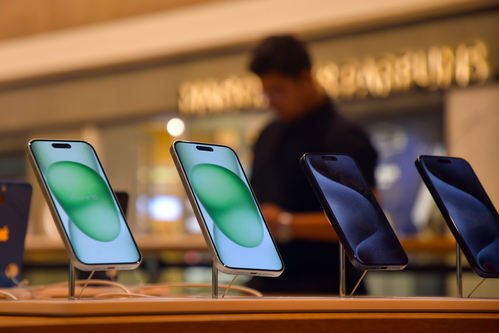New Delhi: Export of iPhones, smartphones, tablets, laptops from India to the US will be cheaper by 20 per cent compared to those shipped from China following the exemptions given by the Trump administration, industry body ICEA said Sunday.
The US government Saturday amended its tariff order to exempt smartphones, tablets, laptops, and some other electronic devices from the new taxes.
“China still has 20 per cent of iPhones, laptops, tablets, and watches. Only reciprocal tariff has been removed for China. India has zero tariff on iPhones and all smartphones, laptops and tablets exported to the US. Vietnam also has zero tariff on all Samsung and other smartphones, laptops and tablets exported to the US. So India and Vietnam are similarly placed on tariffs on these products and both enjoy a 20 per cent tariff advantage over China,” ICEA Chairman Pankaj Mohindroo told PTI.
India Cellular and Electronics Association represents major smartphone companies and their manufacturers, including Apple, Foxconn, Dixon, etc.
Apple’s iPhone ecosystem in India has become the largest job creator in India and is one of the top exported items from the country.
According to ICEA, mobile phone exports from India have crossed an all-time high of Rs 2 lakh crore in 2024-25, registering a 55 per cent growth over the Rs 1.29 lakh crore recorded in 2023-24.
Union minister Ashwini Vaishnaw has said that iPhones alone accounted for Rs 1.5 lakh crore worth of exports in the smartphone segment.
The reciprocal tariff regime announced by US President Donald Trump had raised concerns on Apple’s iPhone production plan in China and India.
However, in a relief for the sector, the Trump administration on Saturday (as per Indian Standard Time) said they will exclude electronics like smartphones and laptops from reciprocal tariffs imposed on China as well as on other countries. The move can help keep prices down for popular consumer electronics goods that aren’t usually made in the US.
US Customs and Border Protection said items like smartphones, laptops, hard drives, flat-panel monitors and some chips would qualify for the exemption. Machines used to make semiconductors are excluded too. That means they won’t be subject to the current 145 per cent tariffs levied on China or the 10 per cent baseline tariffs elsewhere.
“Now there will be no extraordinary disruption. Time to set up capacities, long-term trend against China will remain robust. But the incredible shock of the last few weeks is in itself a tectonic event and the realignments are bound to happen without too much blood spilt in our category,” Mohindroo said.
Semiconductor and electronics industry body IESA President Ashok Chandak said the recent decision by the Trump administration to exempt smartphones, computers, and other electronics from reciprocal tariffs offers a significant — albeit possibly short-term — reprieve for global technology manufacturers and consumers in the US.
He said while the move signals a tactical recalibration rather than a shift in broader trade policy, it is nonetheless a welcome development in terms of easing short-term supply chain disruptions, geopolitical tensions and US consumer resentment.
“Continued underlying tensions and uncertainties may prompt global players to diversify their manufacturing base — creating a timely opportunity for India to emerge as a preferred alternative. Despite the dampening of near-term export euphoria, the long-term opportunity for India remains robust,” Chandak said.
He said with the US importing over USD 250 billion worth of smartphones and computer goods, “30 per cent of which currently come from China, India, with exports currently at USD 12 billion, still has significant headroom to grow”.
“As such, for Indian businesses, this is a vital window to scale up operations, reorient strategies, and strengthen their position in global electronics value chains. To fully realise this potential, India must double down on building long-term, sustainable competitive advantages,” Chandak said.
According to industry analysts, while the exemptions bring relief for the major technology players, the change in stance will lead global investors to carve a long-term strategy for stability in business and investments where India has an edge at the moment with uncertainty in US-China trade relations.
“It is not easy to build such an intricate value chain overnight, even for the US. Our strengths have prevailed showing the resilience we have built over these years. This means business as usual for brands like Apple in India, which will only grow further. At the same time the supply chain has much predictability,” Techarc Chief Analyst and Co-Founder Faisal Kawoosa said.
CyberMedia Research (CMR), VP – Industry Research Group, Prabhu Ram, said the US tariff exclusions offer timely relief to the global tech ecosystem, easing pressure on major players, especially Apple, alongside Dell, Samsung, TSMC, AMD, Nvidia, and the broader semiconductor and hardware industry.
“Whether an olive branch or a pragmatic reset, the move helps reduce friction in a highly interconnected global electronics supply chain. That said, the broader trajectory of US-China trade policy remains uncertain,” Ram said.
Counterpoint Research Vice-President for Research Neil Shah said he believes that moving manufacturing and supply chains to the US by charging higher tariffs is not practical and in turn hurts the most valuable American companies such as Apple, NVIDIA and others.
“Bringing back the manufacturing of smartphones, especially iPhones, is going to be a marathon not a sprint if the US government is serious about it. And, if really serious, it could mean now is not the time and will need a very different strategy and multi-year incentive scheme,” Shah said.
PTI







































